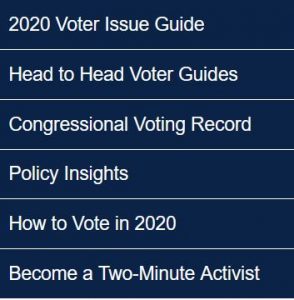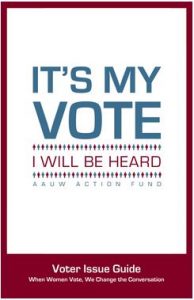BE AN INFORMED VOTER
AAUW is non-partisan but we are passionate about issues that further equality for women and girls. Politicians and policymakers routinely make decisions about issues that directly affect women and families, including our paychecks, access to reproductive health care, and education funding. But more often than not, these conversations lack women’s voices. To create real change, women must be part of the conversation, and the most powerful place for us to  chime in is at the polls.
chime in is at the polls.
With so much at stake each time Americans head to the ballot box, it’s more important than ever to identify those candidates who would best represent our values and those who would roll back our rights. The AAUW Action Fund produces nonpartisan voter education materials each election cycle to provide all women voters with the information they need to cast their ballots.
AAUW Voter Issue Guide
 What’s at stake in this election? Find out using the AAUW Action Fund’s 2020 Voter Issue Guide. This helpful handout provides concise information about key policy issues in the election, including voter access, the gender pay gap, family leave and paid sick days, college affordability, campus sexual violence, and reproductive rights. The guide even includes topical buzzwords and questions to ask candidates. Download here.
What’s at stake in this election? Find out using the AAUW Action Fund’s 2020 Voter Issue Guide. This helpful handout provides concise information about key policy issues in the election, including voter access, the gender pay gap, family leave and paid sick days, college affordability, campus sexual violence, and reproductive rights. The guide even includes topical buzzwords and questions to ask candidates. Download here.
Head to Head Voter Guides
AAUW Action Fund voter guides are provided as a public service and are not intended to be an endorsement of any candidate or political party. No AAUW policy position is implied by the descriptions of these issues. All voter guides use the following position definitions.
Support: Candidate has explicitly stated their support for this policy position on the record with no ambiguity, through statements, co-sponsorship, and/or votes.
Oppose: Candidate has explicitly stated their opposition to this policy position on the record with no ambiguity, through statements and/or votes.
Unknown: The candidate has not explicitly stated their support or opposition to this policy position on the record.
Mixed: The candidate has made conflicting statements and/or has taken conflicting votes on this policy position.
Members of the AAUW Carlisle Public Policy Committee created Head to Head Voter Guides for the districts of the AAUW Carlisle members. The following methodology was used. For incumbents, scoured their voting records, any published interviews, statements on their official websites, and the website VoteSmart, which is a secondary source that accumulates such information. For challengers, relied on their candidate websites and statements made in public forums.
If you aren’t sure of which districts apply to you, go here to find your US Congressional, Pennsylvania House, and Pennsylvania Senate voting district.
Federal
President (created by AAUW Action Fund)
Vice President (created by AAUW Action Fund)
Pennsylvania 10th Congressional (created by AAUW Action Fund)
Pennsylvania 13th Congressional
Pennsylvania State Senate
Pennsylvania House of Representatives
District 86
District 87
District 88
District 92
District 193
District 199
Finally, a brief comment about being political and nonpartisan. Advocacy is often conducted within the political world, which sometimes creates confusion about AAUW’s political work versus our nonpartisan stance. Our work has always been political but has never been partisan. Values influence our work, but what is the line between being political and being partisan? Political work can be characterized by shared values, working toward a common goal, and an end result that is best for the community as a whole. Put simply, being political is a way to influence legislation and regulation through government or public affairs, while partisan activities have a firm adherence to a party, faction, or person. For practical dos and don’ts read Political vs. Partisan: A Guide to Your AAUW Advocacy Actions.
